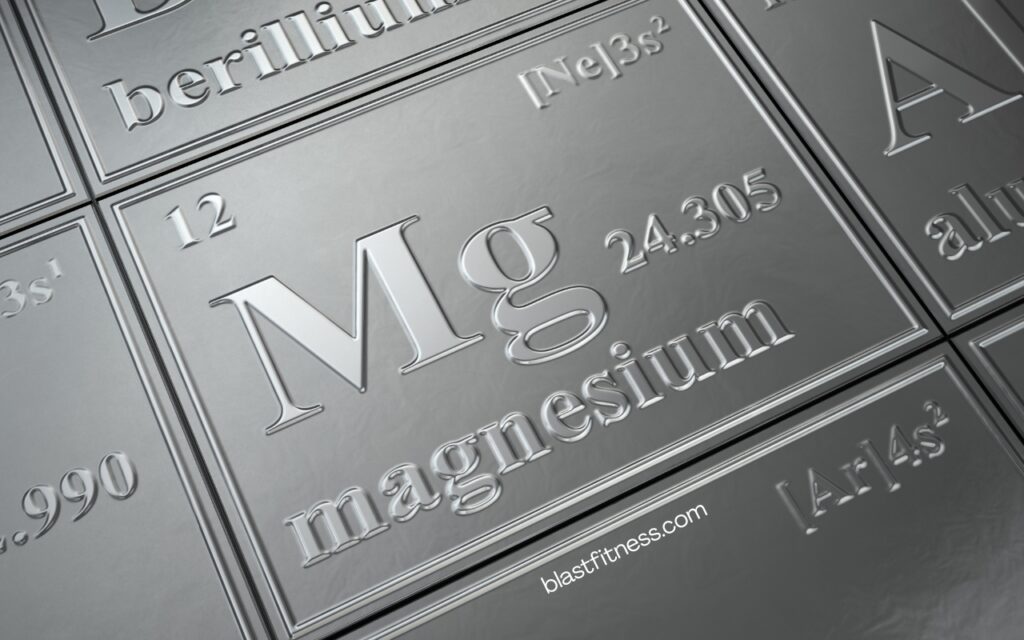
Magnesium is gaining recognition as a powerhouse nutrient in the fitness world. Like protein, creatine, and vitamin D, it plays a fundamental role in physical performance, recovery, and overall well-being. Yet, many athletes and fitness enthusiasts overlook its importance.
At BlastFitness.com, our personal trainers prioritize science-backed nutrition to optimize workouts and recovery. This article explores why magnesium might be the missing piece in your fitness routine and how it can support strength, endurance, and muscle function.
Why Magnesium Matters for Fitness Performance
Magnesium is involved in over 300 enzymatic reactions in the body, making it essential for athletic performance. Key benefits include:
- Muscle Function & Recovery: Supports proper muscle contraction and prevents cramps.
- Energy Production: Plays a role in ATP synthesis, which fuels workouts.
- Nervous System Support: Helps regulate stress, muscle relaxation, and sleep.
- Bone & Joint Health: Contributes to bone density and reduces injury risk.
- Electrolyte Balance: Works with potassium and calcium to prevent dehydration and fatigue.
Are Athletes and Gym-Goers at Risk of Magnesium Deficiency?
Despite magnesium being present in many foods, fitness enthusiasts may have a higher risk of depletion due to increased demand. Intensive training, sweating, and stress can deplete magnesium levels faster than in sedentary individuals.
Factors that increase magnesium loss include:
- High-intensity workouts that increase sweat loss.
- A diet lacking whole foods like leafy greens, nuts, and seeds.
- Excessive caffeine or alcohol consumption.
- Chronic stress and poor sleep, which deplete magnesium stores.
Signs of low magnesium levels include muscle cramps, fatigue, restlessness, and reduced endurance. If these symptoms sound familiar, magnesium supplementation may help improve workout performance and recovery.
How Magnesium Supports Strength, Endurance, and Recovery
1. Prevents Muscle Cramps and Supports Contraction
Muscle cramps are a common issue for athletes, especially after intense training. Magnesium helps regulate calcium levels in muscle cells, reducing cramps and spasms. Research shows that adequate magnesium intake supports muscle relaxation, improving flexibility and reducing injury risk.
2. Enhances Energy and Endurance
Magnesium is critical for ATP production, the energy currency of the body. Low magnesium can lead to faster fatigue and decreased endurance during workouts. Studies indicate that supplementing with magnesium may improve exercise performance, particularly for endurance athletes.
3. Reduces Inflammation and Aids Recovery
Post-workout inflammation is a normal response to training, but excessive inflammation can slow recovery and lead to overtraining. Magnesium has anti-inflammatory properties that may help reduce muscle soreness, speed up tissue repair, and optimize recovery time.
4. Improves Sleep Quality and Stress Management
Quality sleep is crucial for muscle repair and performance. Magnesium helps regulate neurotransmitters like GABA, which promotes relaxation and deeper sleep cycles. Athletes who struggle with sleep or recovery may benefit from increasing their magnesium intake.
Best Sources of Magnesium for Fitness Enthusiasts
Magnesium can be obtained from food, but supplementation may be necessary for those with high activity levels. Some of the best dietary sources include:
- Dark leafy greens (spinach, kale)
- Nuts and seeds (almonds, pumpkin seeds)
- Whole grains (brown rice, quinoa)
- Fish (salmon, mackerel)
- Dark chocolate
Choosing the Right Magnesium Supplement
Not all magnesium supplements are created equal. Different forms of magnesium serve different functions:
- Magnesium Glycinate: Best for muscle relaxation, stress relief, and sleep.
- Magnesium Citrate: Highly bioavailable and supports digestion.
- Magnesium L-Threonate: Known for cognitive benefits and focus.
- Magnesium Oxide: Contains a high concentration but is less bioavailable.
For fitness enthusiasts, magnesium glycinate or citrate is often the best choice for muscle recovery and performance.
How to Use Magnesium for Optimal Performance
- Timing Matters: Taking magnesium post-workout or before bed can support recovery and relaxation.
- Pair with Hydration: Magnesium works with potassium and sodium to maintain electrolyte balance—stay hydrated!
- Start with a Moderate Dose: The recommended daily intake is 400-420 mg for men and 310-320 mg for women.
- Listen to Your Body: If you experience muscle cramps, fatigue, or restless sleep, adjusting magnesium intake may help.
Final Thoughts: Magnesium’s Role in Your Fitness Plan
Magnesium is an underrated yet essential nutrient for anyone serious about fitness. Whether you’re a strength athlete, endurance runner, or casual gym-goer, ensuring adequate magnesium intake can optimize muscle function, energy levels, and recovery.
At BlastFitness.com, we advocate for a holistic approach to training, incorporating proper nutrition, hydration, and recovery. Magnesium may be the missing link in your fitness regimen—make it a priority to fuel your body for peak performance!